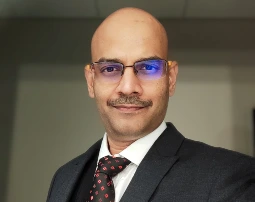Head

Dr. Bhushan Borotikar,
Head, Symbiosis Centre for Medical Image Analysis (SCMIA)
Preface: Neurological disorders, communicable and non-communicable diseases, work or sports related musculoskeletal injuries, and other organ pathologies are all on the rise worldwide. This is partially due to the increasing access to and medical imaging systems and its increasing diagnostic accuracy. Needless to say, healthcare professionals depend heavily on Medical Imaging for diagnosis, treatment, clinical decision making, in-surgery assessment, and post-surgical rehabilitation and follow-up. With the advent of technology in imaging scanners and image analysis/synthesis methods, the medical imaging domain is at the crossroads of transformation. While we prepare ourselves for the era of quantum computing and artificial intelligence (AI), we must change our ways (and processes) to acquire, analyze, and synthesize medical images. Recent advances from computer science, including machine learning, big data analytics, and artificial intelligence have provided the theoretical underpinning and practical data access to develop models that learn directly from data associations across subjects, time, modalities, resolutions, etc.
Education and Experience: With over 20 years of research experience in globally placed state-of-the-science research labs and institutes, Dr. Borotikar is bringing the holistic principles of research in medical imaging sciences to SCMIA. Dr. Borotikar is currently engaged as a research faculty (Associate Professor) and head at SCMIA. He also has adjunct appointments at the Laboratory for the Treatment of Medical Information (LaTIM), INSERM, U1101, Brest, France as a Senior Research Scientist and at the Division of Biomedical Engineering, University of Cape Town, Cape Town, South Africa, as an honorary Associate Professor. Dr. Borotikar completed his PhD from the Cleveland State University, Ohio, USA and Cleveland Clinic, Ohio, USA in 2009 and then worked as a post-doctoral fellow at the National Institutes of Health (NIH), Bethesda, USA till 2014. From 2014 till 2020, he worked as a Senior research scientist at the French laboratory of excellence (LaTIM) which is a part of French National Medical Institutes of Health (INSERM U1101).
Research theme(s): Dr. Borotikar strongly believes that integrating emerging technologies in the current clinical practice to help diagnose, treat, and manage the disorders is key in contributing to the domain of medical sciences. Dr. Borotikar’s true potential lies in building translational research to solve clinical problems. Dr. Borotikar’s research theme seeks to develop an integrated and transformative technology using a confluence of a holistic approach and intuitive information workflows between computational models and clinical practices. Dr. Borotikar’s current research interests are focused on developing clinical tools and procedures using emerging engineering technologies in three domains: 1) Musculoskeletal disorders and sports injuries in adults and children, 2) Computer assisted orthopaedic surgeries, joint implants and medical device designs, and 3) Advances in medical image acquisition, analysis, and synthesis.
Research outcomes and research synergy: Dr. Borotikar has significantly contributed to the scientific community with 39 peer reviewed publications, eight arXiv pre-prints, and over 70 international conference abstracts. He also has two book chapters (one under publication) and one patent application. He is a recipient of multiple international grant fundings as principal investigator and co-investigator. He has been invited as a keynote speaker in five international conferences in the past four years. Dr. Borotikar is regularly involved in advisory boards and review committees of various grant funding mechanisms across the globe. Dr. Borotikar is and active reviewer on 11 international journals in the domain of medical imaging, orthopedics, biomechanics, medical engineering, and nature. Dr. Borotikar is also a founder member of three global research consortiums – one dealing with Pediatric knee disorders, second with geometric morphometrics, and third with joint disorders and computational anatomy in adults. Dr. Borotikar has supervised/co-supervised 4 PhD students, 9 Masters students, 12 Medical residents, and 6 post-doctoral fellows. He is currently supervising/co-supervising 8 PhD students, 3 Masters, 2 medical residents, and 1 post-doctoral fellow.
Contact Information:Symbiosis Centre for Medical Image Analysis, 6th Floor, Symbiosis Institute of Technology, Lavale, Pune – 412115
Phone: +91 20 66936979
Email: head@scmia.edu.in
Current projects: https://scmia.edu.in/project